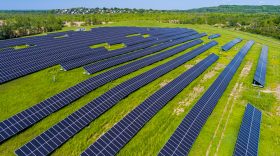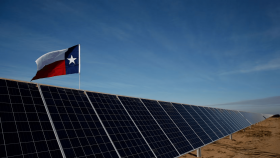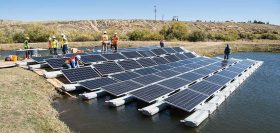Yesterday, the Commerce Department issued a preliminary decision to impose countervailing duties on Chinese PV imports.
The tariffs come after a review of Chinese subsidies to domestic solar firms, at the request of the Coalition for American Solar Manufacturing (CASM). The group, comprised of seven firms led by SolarWorld, filed complaints of unfair subsidies and dumping from Chinese firms back in October.
The Department of Commerce intends to impose a tariff of 4.73 percent on imports from Trina Solar, 2.9 percent from Suntech, and 3.6 percent from all other Chinese manufacturers.
These tariff rates will apply to Chinese-manufactured solar cells, regardless of where the panels using those cells are assmbled. Further, panels assembled in China using non-Chinese cells are not covered by this ruling.
“Today’s announcement affirms what U.S. manufacturers have long known: Chinese manufacturers have received unfair and WTO-illegal subsidies,” said Steve Ostrenga, CEO of Helios Solar Works, one of the members of CASM to recently lift the veil of anonymity.
“We appreciate the Commerce Department’s hard work in bringing these subsidies to light, and we look forward to addressing all of China’s unfair trade practices in the solar industry.”
But these rates are much lower than many in the industry had expected, pleasing opponents of the petitions. Jigar Shah, President of the Coalition for Affordable Solar Energy (CASE), the group that formed to oppose CASM, called it a “relatively positive outcome.”
“However, tariffs large or small will hurt American jobs and prolong our world’s reliance on fossil fuels. Fortunately, this decision will not significantly raise solar prices in the United States as SolarWorld has sought,” said Shah.
“This decision clearly demonstrates that the Commerce Department did not find the Chinese government engaged in massive subsidization, as SolarWorld and CASM claim.”
According to Melanie Hart, China Energy and Climate Policy Analyst at the Center for American Progress, the Department of Commerce based tariffs only on what it could prove, rather than applying punitive duties.
“Chinese companies and officials are watching this case very closely, and hopefully this action will serve as an example in China for how these cases can and should be handled impartially and according to law,” she said.
Hart also argued that SolarWorld took the right step in filing the petitions – rather than standing down out of fear of retaliation, which leads to “tacit accommodation to illegal trade behavior.”
The Solar Energy Industries Association (SEIA) came out in support of a balanced approach, including both standing up for U.S. firms and playing by the global trade rules, but also fostering collaboration.
Rhone Resch, president and CEO of SEIA, called the Commerce action a sign of “a growing trend of trade conflict in the global solar energy industry that threatens to curtail the rapid growth we have seen in this market – both in the U.S. and abroad.”
“Governments and industry must recognize that while trade remedy proceedings such as antidumping and countervailing duty investigations are an important part of the global trade rules, so too are collaboration and negotiations.”
On May 17, the Department of Commerce will issue a preliminary ruling on CASM’s allegation that Chinese firms are dumping solar products on the U.S. market below cost. If Commerce finds the claim to be true, further anti-dumping duties could be levied.
Commerce will make its final determinations in June 2012, and the International Trade Commission will issue a final ruling in July 2012.





